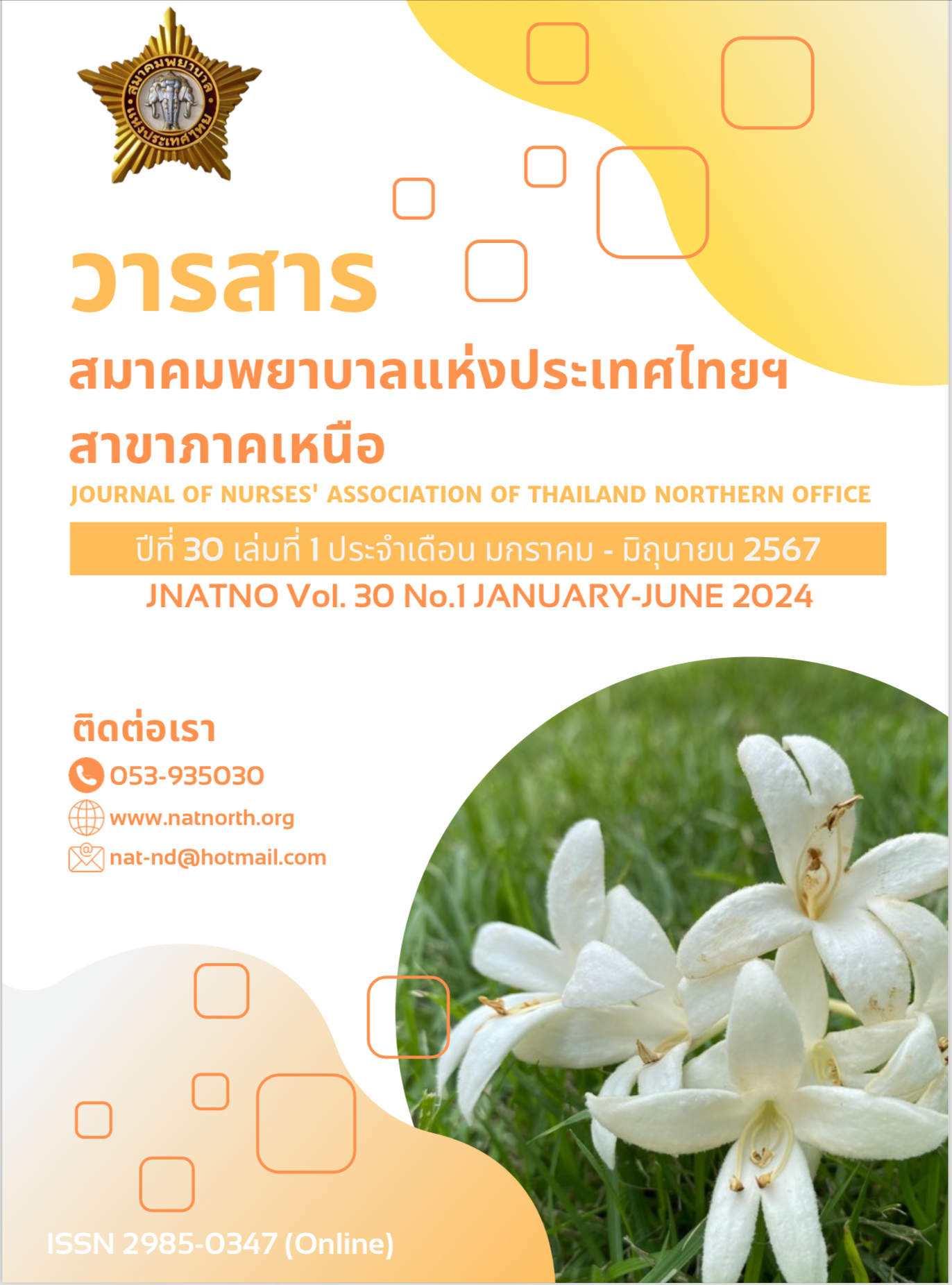ปัจจัยที่มีอิทธิพลต่อความแข็งแกร่งในชีวิตของผู้สูงอายุ ชุมชนเมือง จังหวัดนครสวรรค์
คำสำคัญ:
ความแข็งแกร่งในชีวิต, ผู้สูงอายุบทคัดย่อ
การวิจัยเชิงพรรณนาครั้งนี้ มีวัตถุประสงค์เพื่อศึกษาปัจจัยที่มีอิทธิพลต่อความแข็งแกร่งในชีวิตของผู้สูงอายุ ชุมชนเมือง จังหวัดนครสวรรค์ กลุ่มตัวอย่างได้แก่ ผู้สูงอายุในชุมชนเมือง จังหวัดนครสวรรค์ จำนวน 278 คน เครื่องมือที่ใช้ในการวิจัย คือ แบบสอบถามความเครียด (SPST-20) แบบสอบถามพฤติกรรมสุขภาพ และแบบสอบถามความแข็งแกร่งในชีวิต ตรวจสอบคุณภาพเครื่องมือได้ค่า CVI = 1 และค่าสัมประสิทธิ์อัลฟาของครอนบราค (Cronbach’s Alpha Coefficient) เท่ากับ .90, .75 และ .93 ตามลำดับ สถิติที่ใช้ในการวิเคราะห์ข้อมูล ได้แก่ จำนวน ร้อยละ ค่าเฉลี่ยและส่วนเบี่ยงเบนมาตรฐาน วิเคราะห์ความสัมพันธ์ ด้วยสถิติไคสแควร์ ค่าสัมประสิทธ์สหสัมพันธ์ของเพียร์สัน และการวิเคราะห์ถดถอยพหุคูณ
ผลการวิจัย พบว่า กลุ่มตัวอย่างมีคะแนนความแกร่งในชีวิตเฉลี่ย =120.12 (SD =12.24) กลุ่มตัวอย่างจำนวน 113 คน (ร้อยละ 40.6) มีคะแนนความแกร่งในชีวิตมากกว่าหรือเท่ากับคะแนนเฉลี่ย มีความเครียดระดับปานกลาง ร้อยละ 56.5 และพฤติกรรมสุขภาพระดับปานกลาง ร้อยละ 37.4 ปัจจัยส่วนบุคคลด้านเพศ อายุ รายได้ สถานภาพสมรส การศึกษา และโรคประจำตัวมีความสัมพันธ์กับความแข็งแกร่งในชีวิตของผู้สูงอายุอย่างมีนัยสำคัญทางสถิติที่ระดับ .01 ความเครียดและพฤติกรรมสุขภาพมีความสัมพันธ์กับความแข็งแกร่งในชีวิต ของกลุ่มตัวอย่าง อย่างมีนัยสำคัญที่ระดับ .01 (ค่า r = -.273 และ .575 ตามลำดับ ) พฤติกรรมสุขภาพ (X1) เพศ (X2) รายได้ (X3) และอายุ (X4) สามารถทำนายความแข็งแกร่งในชีวิตของผู้สูงอายุได้ร้อยละ 63.5 อย่างมีนัยสำคัญทางสถิติที่ระดับ 0.01 มีสมการทำนาย = 72.850 + (-.286)(X1) + 6.127(X2) + (-1.652)( X3) + (-3.744)(X4)
ดังนั้นพยาบาลและบุคลากรทีมสุขภาพ ต้องตระหนักถึงปัจจัยด้านพฤติกรรมสุขภาพ เพศ รายได้ และอายุ โดยคำนึงถึงความแตกต่างของบุคคลในการวางแผนจัดกิจกรรมทางการพยาบาล หรือการให้คำปรึกษาทางสุขภาพ เพื่อเสริมสร้างความแข็งแกร่งในชีวิตของผู้สูงอายุ ทำให้ผู้สูงอายุยอมรับในตนเอง เห็นคุณค่าในตนเองและสามารถเผชิญปัญหาหรือเหตุการณ์วิกฤตต่าง ๆ และสามารถฟื้นตัวกลับมาใช้ชีวิตต่อไปได้อย่างปกติสุข คงไว้ซึ่งการมีคุณภาพชีวิตที่ดีของผู้สูงอายุ
เอกสารอ้างอิง
พนิดา ภู่งามดี. แนวคิดการใช้ศิลปะพัฒนาชีวิตผู้สูงวัยในภาวะสังคมผู้สูงอายุ. วารสารมนุษยสังคมศาสตร์. 2566;1(2):11-20.
วราลักษณ์ ศรีนนท์ประเสริฐ. ตอนที่ 5 สุขภาพผู้สูงวัยไทยและปัญหาที่สำคัญ: โครงการสารานุกรมไทย สำหรับเยาวชน สารานุกรมไทยฉบับผู้สูงวัย. พิมพ์ครั้งที่1. กรุงเทพมหานคร: โครงการสารานุกรมไทย; 2560.
Rodrigues FR, Tavares DMDS. Resilience in elderly people: factors associated with sociodemographic and health conditions. Rev Bras Enferm. 2021;74:e20200171.
แววดาว พิมพ์พันธ์ดี. การพัฒนาแนวทางการเสริมพลังความแข็งแกร่งในชีวิตของผู้สูงอายุในเขตระเบียงเศรษฐกิจภาคตะวันออก [ปริญญานิพนธ์ปริญญาสาธารณสุขศาสตรดุษฎีบัณฑิต]. ชลบุรี: มหาวิทยลัยบูรพา; 2562.
โสภิณ แสงอ่อน, พัชรินทร์ นินทจันทร์, ทัศนา ทวีคูณ. ความแข็งแกร่งในชีวิตและภาวะซึมเศร้าของประชาชนในชุมชนแห่งหนึ่งของจังหวัดปทุมธานี. วารสารการพยาบาลจิตเวชและสุขภาพจิต. 2561;32(2):84-99.
มุกข์ดา ผดุงยาม, อัญชลี ช. ดูวอล. กลยุทธ์การฟื้นฟูพลังสุขภาพจิตในผู้สูงอายุ. วารสารพยาบาลกองทัพบก. 2561;19(1):66-73.
ประภาพร มโนรัตน์และคณะ. การเห็นคุณค่าในตนเองของผู้สูงอายุไทยพุทธในเขตชุมชนกึ่งเมืองกึ่งชนบท: กรณีศึกษาบ้านนาโปร่ง ตำบลท่าเสา อำเภอเมือง จังหวัดอุตรดิตถ์. วารสารวิทยาลัยพยาบาลบรมราชชนนีอุตรดิตถ์. 2558;7(2):46-60.
Izadi-Avanji FS, Kondabi F, Reza Afazel M, Akbari H, Zeraati-Nasrabady M. Measurement and predictors of resilience among community-dwelling elderly in Kashan, Iran: A cross-sectional study. Nurs Midwifery Stud. 2017;6(1):e36397.
ฉัตรฤดี ภาระญาติ, วารี กังใจ, สิริลักษณ์ โสมานุสรณ์. ปัจจัยทำนายพลังสุขภาพจิตของผู้สูงอายุ.วารสารคณะพยาบาลศาสตร์ มหาวิทยาลัยบูรพา. 2559;24(2):97-106.
สมเกียรติ สุทธรัตน์, มะยุรี วงค์กวานกลม. ปัจจัยทำนายพลังสุขภาพจิตของผู้สูงอายุในจังหวัดนครพนม. วารสารการพยาบาล. 2567;73(2):40-49.
มะลิ โพธิพิมพ์, สุชาติ บุณยภากร, จีรภา บุณยภากร, วลัญช์ชยา เขตบำรุง, จุน หน่อแก้ว, วรารัตน์ สังวะลี และคณะ. ปัจจัยที่มีความสัมพันธ์กับพลังสุขภาพจิตผู้สูงอายุในชุมชนแห่งหนึ่ง จังหวัดนครราชสีมา. วารสารมหาวิทยาลัยวงษ์ชวลิตกุล. 2564;34(1):22-32.
กรมสุขภาพจิต. แบบประเมินความเครียด (SPST-20) [อินเทอร์เน็ต]. 2554 [เข้าถึงเมื่อ 2564/5/20]. เข้าถึงได้จาก: http://www.sro.moph.go.th.doc.
พัชรินทร์ นินทจันทร์, โสภิณ แสงอ่อน, ทัศนา ทวีคูณ. โปรแกรมการสร้างความแข็งแกร่งในชีวิต(resilience–enhancing program). กรุงเทพฯ: จุดทอง; 2555.
Faul F, Erdfelder E, Lang AG, Buchner A. G*Power 3: A flexible statistical power analysis program for the social, behavioral, and biomedical sciences. Behav Res Methods. 2007;39(2):175-91.
Cohen J. Statistical power analysis for behavioral science. Lawrence Erlbaum Associates Inc; 1988.
Leppink J, O’Sullivan P, Winston K. Effect size–large, medium and small. Perspect Med Educ. 2016;5(6):347–49.
มาโนชญ์ แสงไสยศน์. ปัจจัยที่มีผลต่อพฤติกรรมส่งเสริมสุขภาพของผู้สูงอายุในตำบลบางสะแก อำเภอบางคนที จังหวัดสมุทรสงคราม [ปริญญานิพนธ์ปริญญาวิทยาศาสตร์มหาบัณฑิต]. กรุงเทพฯ: มหาวิทยาลัยเกษตรศาสตร์; 2555.
Maneerat S, Isaramalai S, Jantiya S. A guide to promote elderly resilience: a perspective from Thai context. AJHSS. 2018;6(6).
โสฬวรรณ อินทสิทธิ์ และสิริกุล จุลคีรี. เปลี่ยนร้ายกลายเป็นดี พลังสุขภาพจิต RQ: Resilience Quotient. พิมพ์ครั้งที่ 4. นนทบุรี: กระทรวงสาธารณสุข; 2563.
อรรถกร เฉยทิม. ความสุขของผู้สูงอายุในชมรมผู้สูงอายุเขตกรุงเทพมหานคร. [ปริญญานิพนธ์ปริญญาศิลปศาสตรมหาบัณฑิต]. กรุงเทพฯ: มหาวิทยาลัยศิลปากร; 2560.
เกสร สายธนู, อมรรัตน์ นธะสนธิ์, เกษราภรณ์ เคนบุปผา. ความสัมพันธ์ระหว่างความแข็งแกร่งใน ชีวิตและภาวะซึมเศร้าของผู้สูงอายุในชุมชนแห่งหนึ่งใน จังหวัดอุบลราชธานี. วารสวารการพยาบาลจิตเวชและสุขภาพจิต. 2562;33(3):42-55.
ปณิชา บุญสวัสดิ์, ไอศวรรย์ เพชรล่อเหลียน, จุฑาภรณ์ ทองบุญชู, วันเพ็ญ รัตนวิชา, ญานิศา ดวงเดือน. พลังสุขภาพจิตของผู้สูงอายุ: คลินิกผู้สูงอายุสุขภาพดี. วารสารพยาบาลทหารบก. 2563;21(3):481-90.
กนกภรณ์ ทองคุ้ม, นริสรา พึ่งโพธิ์สภ, นันท์ชัตสัณห์ สกุลพงศ์. พลังสุขภาพจิตในผู้สูงอายุ: แนวคิดและแนวทางการเสริมสร้างพลังสุขภาพจิต. วารสารคณะพยาบาลศาสตร์ มหาวิทยาลัยบูรพา. 2564;29(1):107-16.
มะลิสา งามศรี, หงส์ บันเทิงสุข, ดรุณี ใจสว่าง. ความชุกของความเครียด ภาวะซึมเศร้าและความ เข้มแข็งทางจิตใจของผู้สูงอายุในช่วงการระบาดของโรคติดเชื้อไวรัสโคโรน่า 2019 (COVID-19). วารสารศรีวนาลัย. 2564;11(2):63-76.
ฐานันท์ดา มุสิกสิริจิรกุล, บัวทอง สว่างโสภากุล. ความยืดหยุ่น สัมพันธภาพในครอบครัว การเข้าร่วมกิจกรรมทางสังคมและความพึงพอใจในชีวิตของผู้สูงอายุ ตำบลบางรักพัฒนา อำเภอบางบัวทอง จังหวัดนนทบุรี. วารสารมนุษยศาสตร์และสังคมศาสตร์ มหาวิทยาลัยมหาสารคาม. 2559;35(6):83-94.
MacLeod S, Musich S, Hawkins K, Alsgaard K, Wicker ER. The impact of resilience among older adults. Geriatr Nurs. 2016;37:266-72.
วิไลวรรณ ปะธิเก, ขนิษฐา วิศิษฏ์เจริญ. บทบาทของพยาบาลชุมชนเพื่อการส่งเสริมพลังสุขภาพจิตในผู้สูงอายุไทย. วารสารวิทยาศาสตร์สุขภาพ วิทยาลัยพยาบาลบรมราชชนนี สรรพสิทธิประสงค์. 2562; 3(1):1-12
กรรณิกา เรืองเดช ชาวสวนศรีเจริญ, ไพบูลย์ ชาวสวนศรีเจริญ, เสาวลักษณ์ คงสนิท. ปัจจัยทำนายความแข็งแกร่งในชีวิตของผู้สูงอายุอาศัยในสถานสงเคราะห์คนชราพื้นที่ภาคใต้. วารสารสุขภาพจิตแห่งประเทศไทย. 2562;27(2):65-79.
ดาวน์โหลด
เผยแพร่แล้ว
รูปแบบการอ้างอิง
ฉบับ
ประเภทบทความ
สัญญาอนุญาต
ลิขสิทธิ์ (c) 2024 สมาคมพยาบาลแห่งประเทศไทยฯ สาขาภาคเหนือ

อนุญาตภายใต้เงื่อนไข Creative Commons Attribution-NonCommercial-NoDerivatives 4.0 International License.
บทความที่ได้รับการตีพิมพ์เป็นลิขสิทธิ์ของสมาคมพยาบาลแห่งประเทศไทยฯ สาขาภาคเหนือ
เนื้อหาและข้อคิดเห็นใดๆ ที่ตีพิมพ์ในวารสารสมาคมพยาบาลฯ ถือเป็นความรับผิดชอบของผู้เขียนเท่านั้น ผู้เขียนบทความต้องศึกษารายละเอียดหลักเกณฑ์การจัดทำต้นฉบับตามที่วารสารกำหนด และเนื้อหาส่วนภาษาอังกฤษต้องได้รับการตรวจสอบจากเจ้าของภาษามาแล้ว


